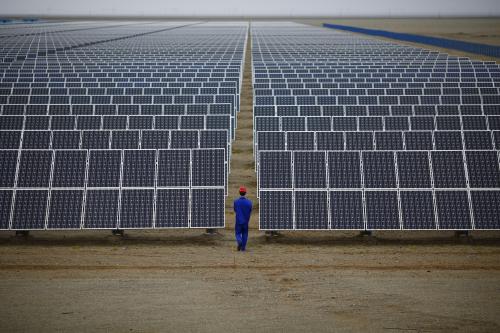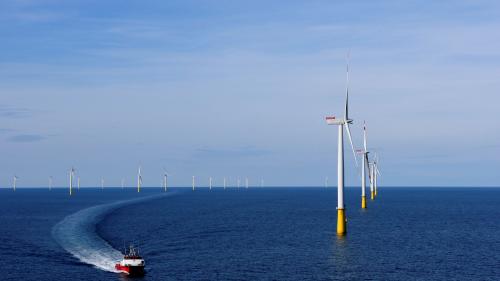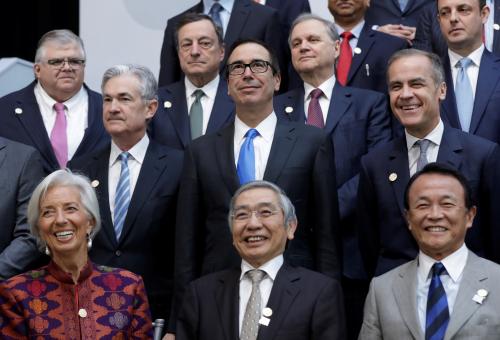In his “I Have a Dream” and “Beyond Vietnam” speeches, the Rev. Dr. Martin Luther King spoke of a “fierce urgency of the now” for “vigorous and positive action” on civil rights, peace, and social justice. Today, such action is just as urgent to tackle polarizing inequality, financial instability, and a breakdown of the climate system.
The 2030 Agenda for Sustainable Development and the Paris Agreement on climate change can serve as a 21st century mission for vigorous and positive action. Ambitious efforts are underway at the local and national levels, but without concerted global action the big investment push and structural transformation that are necessary to achieve these shared goals will fail to materialize.
The Parliament of the United Kingdom recently declared a climate emergency and the idea of a green new deal has captured the political imagination across continents. More locally, communities in Niger have adopted a Farmer Managed Natural Regeneration program—a low-cost land restoration scheme that increases climate-resilient food and timber production to reduce poverty and hunger among poor subsistence farmers. The city of Helsinki has enacted a participatory development program aimed at increasing openness and participation in urban infrastructure and planning.
But efforts like these are sailing against the wind unless the multilateral finance, trade, and investment regimes are aligned with the Sustainable Development Goals (SDGs) and Paris goals.
A decade ago at the G-20 in London, vigorous and positive action helped stem the global financial panic triggered by the collapse of the subprime mortgage market in the United States. But the accompanying talk of a fresh start for the wider multilateral system—“a new international order” for President Sarkozy, “a new Bretton Woods” for Prime Minister Brown—was quickly shelved in favor of what Martin Wolf has dubbed “a desire to go back to a better past.” The dangers of retreating to a world marked by extreme inequality and financial fragility are apparent everywhere.
G-20 leaders please stand up
Leaders convening in Japan will, no doubt, face an uphill struggle to find a forward-looking consensus. A strong coalition will be needed to compensate for the U.S. and others that appear hostile to building a multilateral compact for financial stability, social inclusion, and carbon neutrality.
But some G-20 countries have shown they can lead. As the U.S. has signaled its intent to withdraw from the Paris Agreement, others such as China, Germany, and the U.K. are leading by phasing out fossil fuels, investing in clean technologies and advancing green industrial policies; but actions at home must be globalized. These countries need to champion bold global public solutions for a shared global agenda.
As indicated in a recent report by the World Resources Institute, multilateral development banks (MDBs) and other development finance institutions across the world have begun to move in the right direction. WRI shows that most MDBs have pledged to align with the Paris agreement and shift a percentage of their balance sheet toward green growth, and to shun economic activity that needs to be phased out. The European Investment Bank has pledged to shift 35 percent of its lending toward sustainable activity, the BRIC-led New Development Bank has pledged 66 percent, and the Asian Development Bank 75 percent. Almost all of the MDBs have effectively stopped financing upstream oil and gas, and coal-fired power plants. Last year the MDBs provided upwards of $35 billion in climate finance.
Even larger are the networks of subregional and national development banks such as the China Development Bank, Development Bank of South Africa, the KfW of Germany, the Brazilian National Development Bank, and the AfD of France. Institutions like these have formed the International Development Finance Club (IDFC) and have also officially committed to align their financing with the Paris Agreement. Last year IDFC members provided $200 billion in climate finance.
For sure, these efforts are encouraging but $235 billion is just 3 percent of the more than $7 trillion needed annually in sustainable infrastructure financing compatible with the SDGs and Paris alone. Development finance institutions have been trying valiantly to leverage their balance sheets to bring the private sector in, but the results speak for themselves—catalyzing at most $60 billion per year with hardly any flowing to the least developed countries. Moreover, there is concern that these banks are taking on the big risks so that private firms can come in and cherry-pick the most lucrative projects.
While the development finance institutions discriminate against dirty and noninclusive forms of activity and accelerate the diffusion of cleaner and more accessible technology, the system of trade and investment treaties provides the opposite incentives. Rather than ultra-high tariffs and investment restrictions on fossil fuels and highly monopolistic industries, countries can incur significant damages for enacting policies or building industries that even hint at threatening the incumbency of these industries of yesteryear.
The ambition of the development finance community has also been hampered by a lack of alignment in the international financial system. Emerging market and developing countries are sitting on $6 trillion in dollar reserves that could be invested in the SDGs and Paris. Their decision is not an irrational one under existing arrangements. The global financial monetary system has proven to be inherently unstable—where expansionary monetary policy in the U.S. and other advanced economies creates surges of short-term capital flows into emerging markets and contractionary policy creates sudden stops that trigger financial instability and crises. Developing countries are wary of going to the IMF for help, given their lack of voice in the institution and its tendency to prescribe remedies that make matters worse, not better. Instead, the developing world hoards hard-earned savings to protect their economies from instability rather than invest in a sustainable and inclusive future.
A roadmap for reform
The international finance system will need to be reformed in these areas if it is to become fit for delivering the SDGs.
There is low hanging fruit. G-20 members should collectively task their finance ministers and central banks to join the Coalition of Finance Ministers for Climate Action and the Network of Central Banks and Supervisors for Greening the Financial System (NGFS). But the serious action lies elsewhere.
The G-20 should push for a reformed IMF tasked with reducing speculative financial flows and augmenting that capital in support of productive, low-carbon investments, including through the monitoring and elimination of misguided subsidies and the elimination of illicit financial flows. What is more, when crises do occur, the remedy should be for countercyclical and inclusive responses rather than austerity and social unrest. But for many emerging economies, the pressures from servicing their external debts hinder them mobilizing resources for productive investment; and when disaster strikes—as it did recently in Southeast Africa—the 2030 Agenda is over. A multilateral mechanism for restructuring sovereign debt is integral to meeting the SDGs.
Development banks across the world, at the national and global levels, will need to work together to help countries identify low-carbon high productivity activities and design appropriate industrial policies, to scale up their resources in sustainable infrastructure, and to support a just transition for workers and communities attached to carbon-intensive and outdated economic activity. The required capital injection for these banks could come from recovered illicit financial flows including a clampdown on tax avoidance by transnational corporations and high-wealth individuals.
Perhaps most importantly, trade ministers should work to introduce reforms to the WTO and the myriad treaties to accelerate trade and investment in net-zero carbon economic activity, to eliminate incentives for trade and investment in sectors that are in need of phase out, and to encourage green industrial policies for full employment at living wages. And they should do so in full knowledge that developing countries face specific challenges that will need differential support and sufficient policy space.
We have just under a dozen years to effect a drastic reduction in carbon emissions and achieve the broader set of SDGs. The increase in climate-related catastrophes, in social unrest, and in the rise of right-wing populism are early warnings of what will become a new normal. Even if the United States has, for the moment, foregone its leadership role, then it is up to other G-20 leaders in Osaka to confront “the fierce urgency of now” with “vigorous and positive action.” Time is running out.
The Brookings Institution is committed to quality, independence, and impact.
We are supported by a diverse array of funders. In line with our values and policies, each Brookings publication represents the sole views of its author(s).








Commentary
The fierce urgency of now: Toward a new multilateralism
June 24, 2019